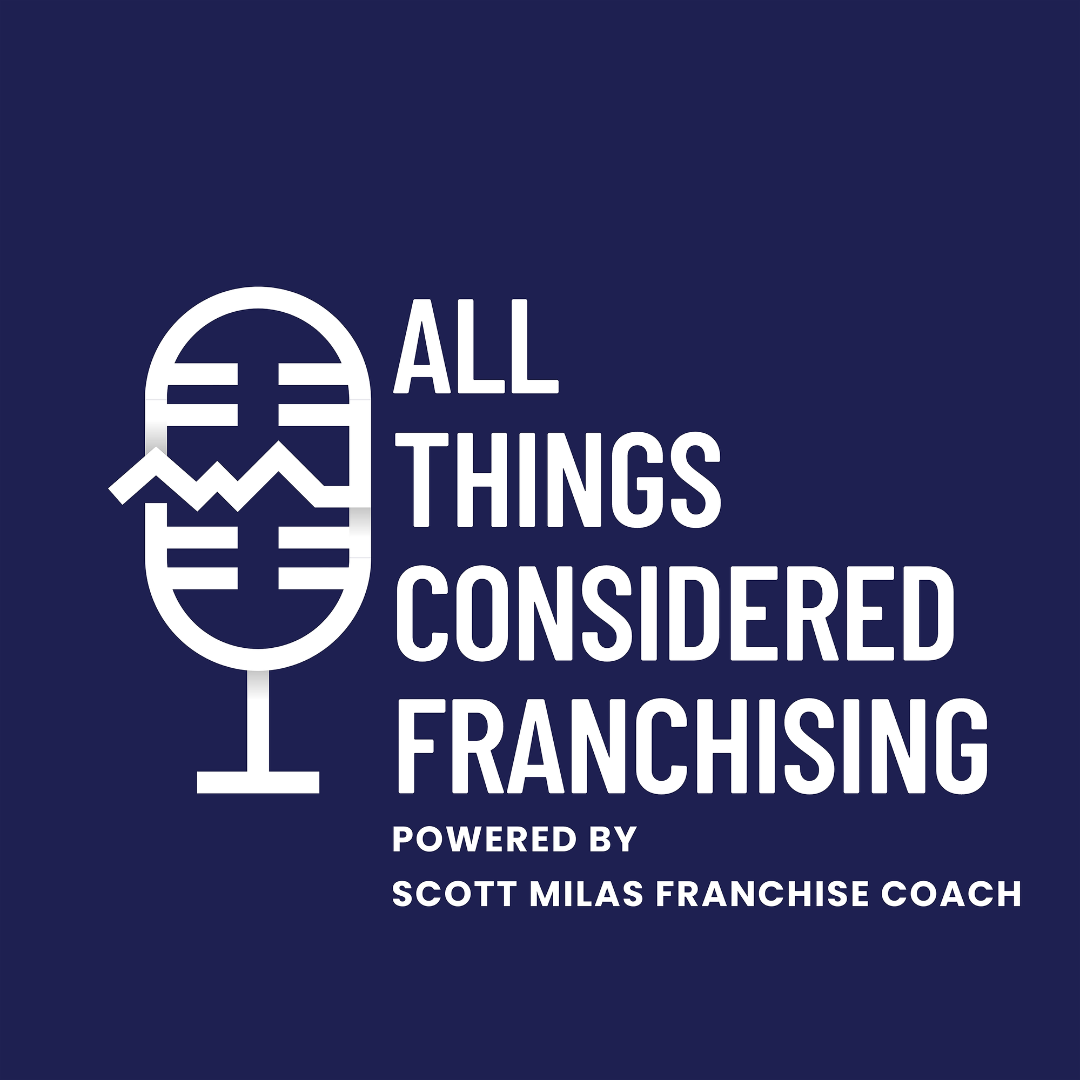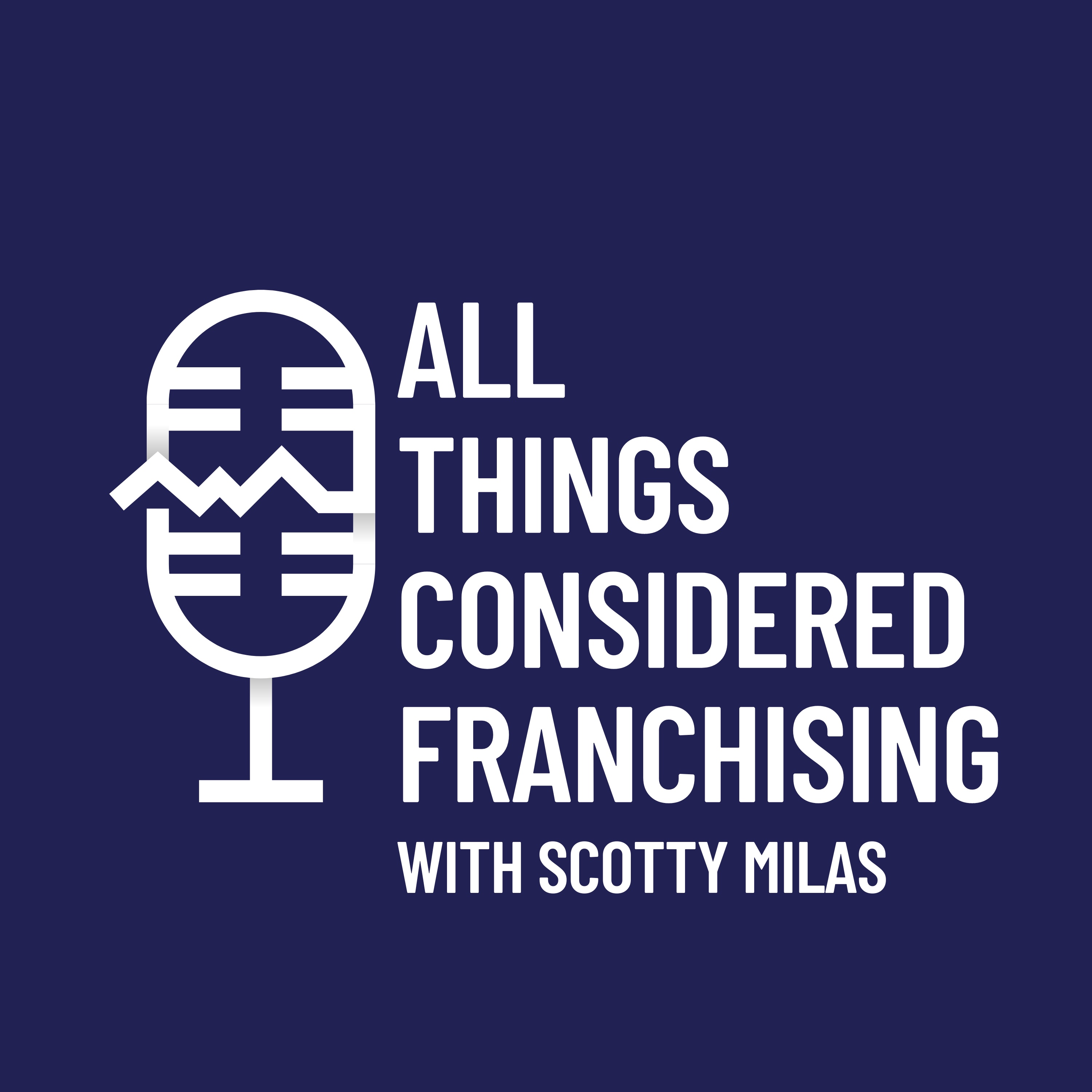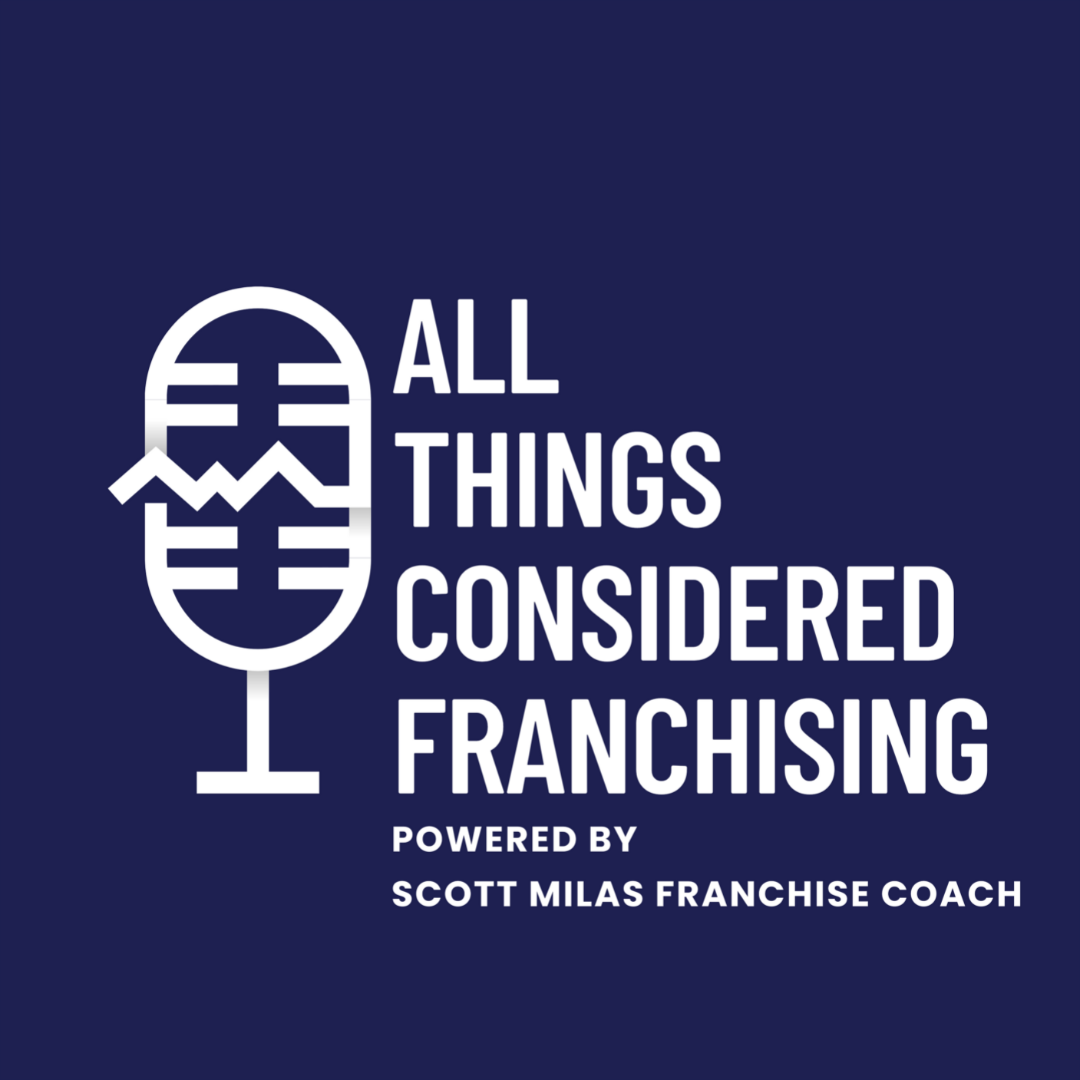[00:00:06] Hey, everybody, and welcome to another episode of All Things considered. Franchising, powered by Scott Milas, franchisecoach.com. I am your host, Scott. Scotty Milas. Today we're going to dive into episode number two of our educational series. It. And this one is to talk more about your decision to move forward, to learn more about business ownership, investing in a franchise in episode one, just as a refresher course to remind you on some of the things that we talked about, if you haven't already listened, you may want to go back and listen to episode one. It talks about the steps to take to initiate conversations to learn more.
[00:00:53] And that's really kind of understanding your no. And getting to know your why and, of course, whether you want to tackle this on your own or work with a franchise consultant like myself. So to start off episode two again, you've made the decision you want to learn more. And I guess the best way for me to put that is high five.
[00:01:17] Congratulations, because it's a big step to want to learn more. Now you're going to need to put yourself in a position of really opening the door wide open and taking in the information and listening and asking good, validated questions. So how are you going to do that? So your first step is decide if you're going to work on this on your own or work with a consultant. So let's take the first one doing this on your own. So the first step I would encourage you to do is to grab a legal size piece of paper, sit down with a significant other spouse, a partner, and draw up some ideas, categories, things that you would like to invest in or business categories you would like to invest in and really kind of research responsibilities or discuss the responsibilities that each of you are going to take. Now, you may be in a situation where you are the investor and you have an operational partner or vice versa, or you have a spouse. That's really kind of saying, hey, Bob. Hey, Tom. Hey, Mary. Hey, Susan. You know what?
[00:02:31] I'll support you, but I don't want anything to do with this business. So this is going to be your career. So if you want to take this leap, great. If you want to bounce ideas off me, talk to me about it, great. But I would certainly encourage whatever direction you take or how you move forward on this, that you keep your operational partner, significant other spouse in the loop of what's going on. If your spouse is going to be involved in the business, I would encourage you both to sit down at the dinner table or after dinner, whether it's a cup of coffee, bottle of wine, a stiff drink, as they say. And each of you kind of write out what you think the other's responsibility in the business are going to be. And again, you don't have to know what business you're going to be investing in, but you really want to get a basis of what the other's responsibilities are going to be and discuss it and agree to it. As you move forward and decide on the business, the last thing you want to do is invest in a business, open a business, start a business, and have the business interfere with your relationship. And if you have kids, the relationship with the kids. So that's step number one. So let's just say as we continue down the path, that you're wanting to do this on your own. I would encourage you to decide what categories or what things are our interest to you.
[00:03:58] Let's throw out some categories that may be of interest. Pets. I love the pet industry. Why do I love the pet industry? It's a need, not a want.
[00:04:07] More and more families, homes have pets than ever before. And with people kind of going back to work or getting out of the home office scenario, people need services for pets, whether it's grooming, whether it's veterinarian transportation, whether it's dog sitting, cat sitting, dog walking, medication.
[00:04:34] There are just a whole bunch of different services in the pet industry. The other industries that I really like more of needs and wants are beauty, hair, reoccurring revenue, everybody needs a haircut, or everybody wants a haircut. And typically people are getting their haircut every six to eight weeks.
[00:04:54] It's recession resistant. It's technology resistant because, let's face it, your smartphone is not going to cut your hair. Although the application, the technology in the sense of being able to book online, is important as far as the operation of the brand. So needs versus wants, those are just a couple of categories. Wants are what I consider the food industry. I want to go out to dinner tonight. I want to go out for breakfast. I want to go out to lunch.
[00:05:25] The need to eat is obviously there.
[00:05:28] We can all agree on that. But the need or the want to go out is a whole different category.
[00:05:37] Health and fitness. I want to be healthy. It's not necessarily a need, although it should be. But I want to go to the gym today. I want to go to my nutritionist. I want to go see a specialist on dietary. So these are just some of the things that you should be talking about as far as categories, needs versus wants, other types of categories, education, children's education, home services.
[00:06:07] The other thing to start thinking about is your skill sets as far as sales aptitude. Are you the type of person that can sit in a board meeting and make a presentation? Can you go to somebody's home or business and make a presentation? Are you the type of person that can promote your business at a chamber event, a BNI business networking event? So these are all the skill sets that you have to kind of look at yourself in regards to any type of service based business, whether it's b to c or b to b.
[00:06:39] The other thing you have to start taking a look at is obviously the time that you want to put into a business.
[00:06:48] There is a trend right now that everybody's thinking semi absentee. Well, I am a firm believer there's really no such thing as semi absentee. Now there are what we call true passive investments, where the brand is going to run the business for you. They're slim as far as the number of companies that do this, but they are out there. But semi absentee, you still have to put 20 hours a week in. So if you're already working 50, 60 hours a week and you have to now put in another 20, and a lot of that could be oversight. Managing the manager, payroll, the books. You also have to keep your options open if there's kind of a need for you to get into the location or there's a problem at someone's home or business on a service that your company may be providing. So again, I would caution you on semi absentee. Personally, I would tell you that if you really want to open your business, the best way to do that is to do this by exiting corporate America and spending the time that you're putting in the corporate side into your own business. That's the best way to scale the business. It's the fastest way to be successful. And again, you're hands on. You become kind of the owner of the business day to day and managing your employees and other related managers that you may have.
[00:08:05] So those are some of the things that you can start thinking about yourself. But the issue you're going to run into if you're doing this all by yourself is how do you find those brands that fit into those categories? I guess you can do Google search. You can start going on some website portals, lead portals, franchise portals, start clicking some boxes. But as I said in episode number one, you are going to be inundated with phone calls, even from brands that you probably didn't even check the box on. So my suggestion is that the best way to tackle this especially if it's the first time that you're doing it, is to work with a seasoned, educated, experienced franchise consultant. And I mean that in the sense that it's someone who understands franchising, how franchising works, the relationship between the franchise or and the franchisee, and someone who has a good inventory of options for you in the different categories. So by going to a consultant, someone like myself, what's going to happen is that consultant is going to take you through what we call a consultative process, a consultative meeting. Other terms are business criteria, options, and we're going to start in this consultation process will typically take about 45 minutes to an hour. And really we're going to start breaking down your understanding, your why a little bit more, getting into a lot more minutiae of the details, and also understanding what your no is. We're going to start talking about financial goals. But the biggest picture that we're going to start painting is if you were to open a business and you were in the process of investing and investing and you've been open five years, how would life be different for you? So we're going to put you in a seat to start thinking as a business owner and not as a w two employee. So that's the beauty of working with a franchise consultant, someone like myself. We're just going to break this all out for you. And by the end of that criteria, business meeting, the consultation, extensive amount of notes on the consultant side, we're going to be able to present to you kind of a roadmap and a best case scenario and be able to introduce you to options brands that kind of fit that criteria. We're also going to take into consideration the types of business categories that you're interested in. We're going to talk about the number of employees. Do you want skilled labor? Unskilled labor? We're going to talk about your investment level. We're going to set you off in a direction to start talking to somebody about, or we should be anyway. At least that's what I do. Start talking about financing options, getting a bigger picture of what you can potentially invest in and what you should stay away from. So working with a consultant, it does have its advantages. So just to kind of recap here, because I know it may sound a little bit confusing, but you've made up your mind in episode one that this is what you want to do now. You have to start creating the outline the criteria of what types of businesses are going to be best fit. Now, the beauty of working with someone like myself and a franchise consultant, is that the criteria? The model can change that. The more you learn and start engaging in conversations and build out this model and then eventually talking to franchiseors brands, you may realize that that's not what I want to do. I want retail versus service based or vice versa.
[00:11:52] So working with someone like myself is going to really help you kind of roadmap this out. It's kind of like if you're driving cross country and your first stop is point a and you're leaving from your home, you're going to go to waze Google Maps and you're going to plot this all out. Well, that's what a franchise consultant is going to do. Someone like myself is going to help you plot this out, to be able to introduce you to the opportunities that potentially fit.
[00:12:22] Now, the key to remember now that you've made up your mind to go forward, is that you want to leave the door wide open to educate yourself about the brand. The biggest mistake that you're going to make is if you say to yourself, I want to research this on my own. After being introduced to opportunities by the franchise consultant, I call it predetermining what your expectations are going online. Yes, you can find some basic information, that 30,000 foot view, but if you're working with a good consultant during the brand presentation, they've already given you that 30,000 foot view. My clients, we work it this way. We have the red light, yellow light, green light scenario. The red lights are this. Scotty, thank you very much. These are just definitely brands that I just don't see myself doing. Or would I enjoy being a business owner? So again, remember, it's not always about enjoying it, but can you see yourself managing this business on a day to day basis and oversight on the business model and of course, the delegation of the people that you may have working in the business.
[00:13:32] So you've got to kind of eliminate your red lights.
[00:13:38] Pick your yellow lights and those yellow lights. Hmm. Scotty, I never really thought about something like that. Sounds interesting. And of course, your green light is, hey, that kind of checks all the boxes or pretty close to all the boxes. So I always encourage my clients to pick one yellow light, one green light to start the conversations. Just a side note here that you don't want to talk to any more than two or three brands at a time. You got to figure it's going to be one to 2 hours a week minimum per brand. So if you're talking to three brands and you're doing, let's just say, 2 hours. That's 6 hours a week. And that may be a little much. It gets a little overwhelming with information. So I would encourage you to stick to two. One yellow light, one green light.
[00:14:23] So just to recap here in step two, here in this educational series, after you've made up your mind you want to learn more, you really have to draw out your roadmap. So if you're going to do it yourself, draw out your roadmap. Just don't go online and start picking brands. Start categorizing this and breaking it down to what you're looking for in the business investment level, what your potential earnings are that you want to earn. If you're working with a consultant like myself, a consultant can help you do this. So that's it for now in episode two. But that's how you strategically start thinking about and start looking at brands again, I don't encourage anybody just to go online and start checking boxes because it's just not going to work. There's a lot of details fine print that you're going to want to know about the brand before you start actually having those conversations with them. So that's it for now. I'm Scotty Milas again, founder and podcast host of all things considered franchising. Visit our
[email protected], or go to all of the podcast channels to see all of our 70 plus episodes at this point. And of course, this is educational series number two on the path to business ownership.
[00:15:47] If you would like to engage in my services, feel free to visit my website, scottmilosfranchisecoach.com. Fill out the inquiry form and I will reach out to you, and we'll start scheduling the process to take a deeper dive into what you're looking for in a business. So again, Scotty Milos here. All things considered franchising, powered by scottmilasfranchisecoach.com.
[00:16:08] We'll be back with episodes three shortly.


